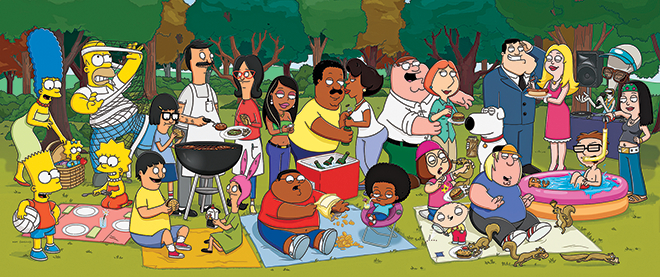Putting the fun back in ‘functional’
A prime-time cartoon about a happy, loving family. How radical.
Share

It’s a moment you’d never see on Family Guy: A mother and father ask their daughter to pick a side in a meaningless argument—in this instance, about whose spice-container system would make for a better science-fair project. “I love you both equally!” the daughter blurts out. “Oh, who cares!” the dad shouts. He pauses, then softens, sheepish. “Sorry. I love you, too.”
The exchange comes from the Belcher family on Bob’s Burgers, a quirky and wholly charming cartoon about a mom-and-pop burger shack that has found its stride in this, its fourth season. Last year, the show landed on top critics’ end-of-year best-of lists, and earned solid ratings in the vaunted 18-49 male demographic. Even more remarkable, what seems to be resonating with audiences is its rather wholesome brand of familial love: The show wears its heart on its greasy sleeve.
“If you relax just a little and you give yourself permission every once in a while to let a sweet moment happen without being embarrassed by it,” Loren Bouchard, the show’s creator and executive producer says, “I think you have a better product at the end of the day.” That proclivity for warmth has followed Bouchard in his career, which began with the ’90s Comedy Central cartoon Dr. Katz, Professional Therapist. The show, which developed what he calls his “sweet tooth,” paired the voice talents of Jonathan Katz and H. Jon Benjamin—who plays Belcher paterfamilias Bob. Once in the vocal booth, the two shared an unexpected chemistry. “I think [Katz] really regarded Jon Benjamin as a son he never had—a showbiz son, if you will—and that relationship was intoxicating,” said Bouchard.
For a sense of how unusual his latest show is, look at its peers on Fox’s Animation Domination Sunday-night slate. On Family Guy, an infant defies his best friend—a talking dog—in his active efforts to murder his mother, while the family exiles daughter Meg; on the now-canned The Cleveland Show, the family merely tolerated its doddering patriarch; on The Simpsons, Homer routinely strangles his son. Elsewhere, South Park’s families are hopelessly dysfunctional, part of the show’s crude tone. King of the Hill came closer, but its Southern sensibility made it narrower in scope. Prime-time cartoons have tended toward edgier portrayals of just about everything, and yet viewers are tuning in to a show about a happy, loving family—the first of its kind since the earliest seasons of The Simpsons.
That nod is intentional, according to Bouchard, a self-described “very serious fan” who would record Matt Groening’s seminal show on his VCR while bartending on Thursday nights. “People took from The Simpsons what they wanted. Some people, the sharp jokes were what they wanted. I remember it for the depth of the characters, the believability.”
On Bob’s Burgers, villains come in the form of relatable forces: the mother’s still-smitten ex-boyfriend who becomes a grudge-holding health inspector; a dictatorial science teacher; a cruel, popularity-hungry girl. The protagonist is almost always the family, rather than any one individual, because families pull together. The characters’ eccentricities keep it from veering into the saccharine: the burgeoning sex drive of the eldest daughter, the sneakiness of the youngest.
“The writing and the performances are enough that you think these animated people really care about each other,” says John Ortved, author of The Simpsons: An Unauthorized, Uncensored History. “You can definitely make the [early Simpsons] comparison, but the humour on Bob’s Burgers is much faster—there are many more jokes per page.”
Why is Bob’s Burgers finding its moment now? Scott Henderson, a social sciences professor at Brock University in St. Catharines, Ont., says it’s in part because the family dynamics of newer cartoons make the show feel essentially modern. “That Simpsons idea of everybody on the couch watching the same show has always been a bit of a myth,” he says. “When Family Guy and The Simpsons pick that apart, the sympathetic family in Bob’s Burgers is actually a bit of a twist.” Bouchard himself is unsure. But he does know this: “There’s one very universal thing you can count on: that everyone in your audience has a family.”